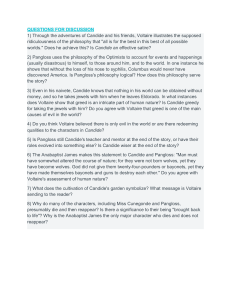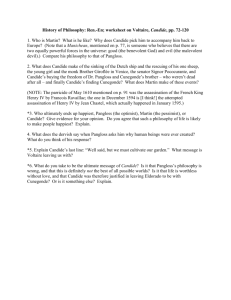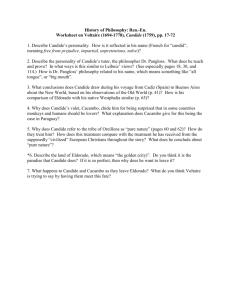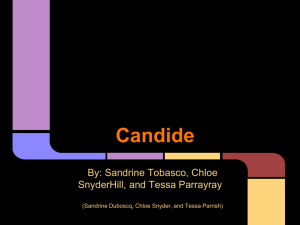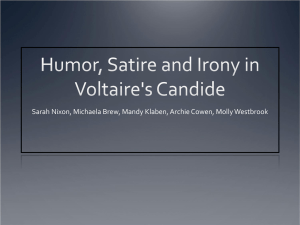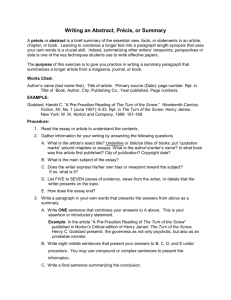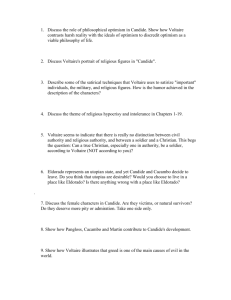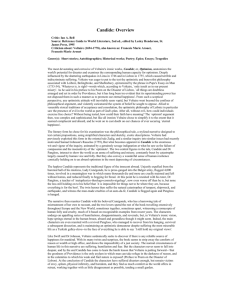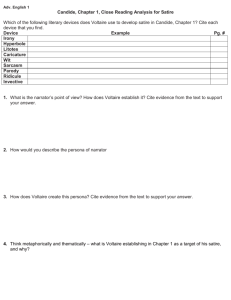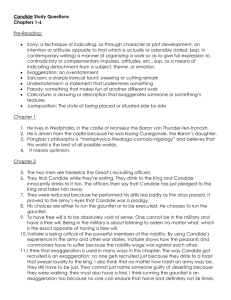CandideAnalysisChapters1-5.doc
advertisement
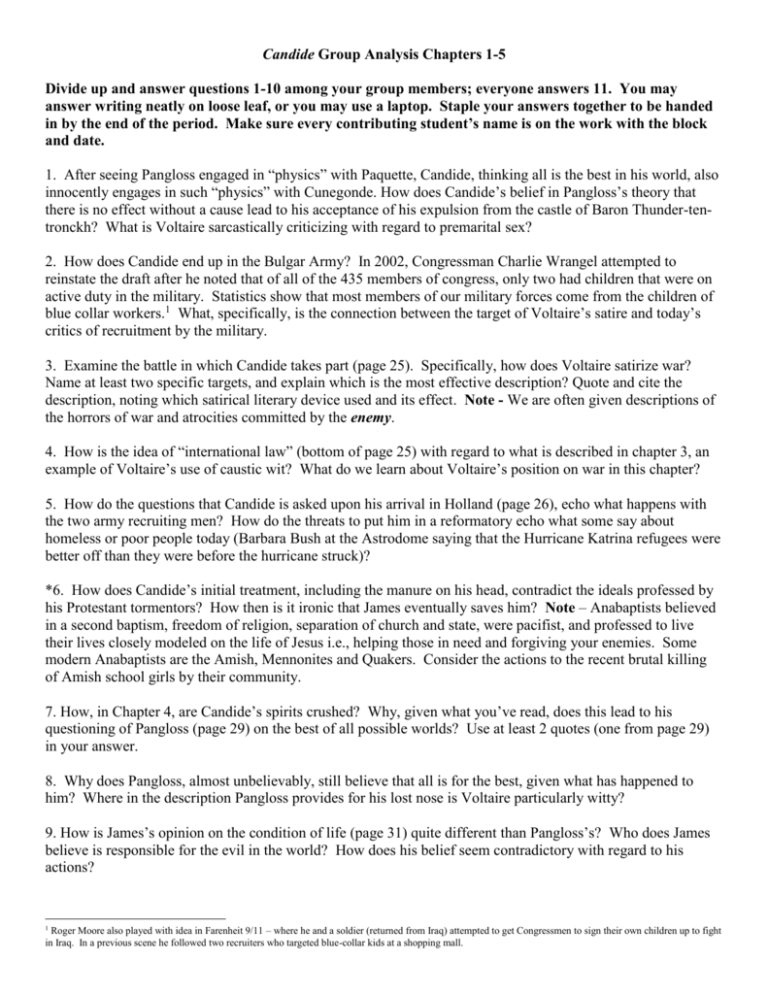
Candide Group Analysis Chapters 1-5 Divide up and answer questions 1-10 among your group members; everyone answers 11. You may answer writing neatly on loose leaf, or you may use a laptop. Staple your answers together to be handed in by the end of the period. Make sure every contributing student’s name is on the work with the block and date. 1. After seeing Pangloss engaged in “physics” with Paquette, Candide, thinking all is the best in his world, also innocently engages in such “physics” with Cunegonde. How does Candide’s belief in Pangloss’s theory that there is no effect without a cause lead to his acceptance of his expulsion from the castle of Baron Thunder-tentronckh? What is Voltaire sarcastically criticizing with regard to premarital sex? 2. How does Candide end up in the Bulgar Army? In 2002, Congressman Charlie Wrangel attempted to reinstate the draft after he noted that of all of the 435 members of congress, only two had children that were on active duty in the military. Statistics show that most members of our military forces come from the children of blue collar workers.1 What, specifically, is the connection between the target of Voltaire’s satire and today’s critics of recruitment by the military. 3. Examine the battle in which Candide takes part (page 25). Specifically, how does Voltaire satirize war? Name at least two specific targets, and explain which is the most effective description? Quote and cite the description, noting which satirical literary device used and its effect. Note - We are often given descriptions of the horrors of war and atrocities committed by the enemy. 4. How is the idea of “international law” (bottom of page 25) with regard to what is described in chapter 3, an example of Voltaire’s use of caustic wit? What do we learn about Voltaire’s position on war in this chapter? 5. How do the questions that Candide is asked upon his arrival in Holland (page 26), echo what happens with the two army recruiting men? How do the threats to put him in a reformatory echo what some say about homeless or poor people today (Barbara Bush at the Astrodome saying that the Hurricane Katrina refugees were better off than they were before the hurricane struck)? *6. How does Candide’s initial treatment, including the manure on his head, contradict the ideals professed by his Protestant tormentors? How then is it ironic that James eventually saves him? Note – Anabaptists believed in a second baptism, freedom of religion, separation of church and state, were pacifist, and professed to live their lives closely modeled on the life of Jesus i.e., helping those in need and forgiving your enemies. Some modern Anabaptists are the Amish, Mennonites and Quakers. Consider the actions to the recent brutal killing of Amish school girls by their community. 7. How, in Chapter 4, are Candide’s spirits crushed? Why, given what you’ve read, does this lead to his questioning of Pangloss (page 29) on the best of all possible worlds? Use at least 2 quotes (one from page 29) in your answer. 8. Why does Pangloss, almost unbelievably, still believe that all is for the best, given what has happened to him? Where in the description Pangloss provides for his lost nose is Voltaire particularly witty? 9. How is James’s opinion on the condition of life (page 31) quite different than Pangloss’s? Who does James believe is responsible for the evil in the world? How does his belief seem contradictory with regard to his actions? Roger Moore also played with idea in Farenheit 9/11 – where he and a soldier (returned from Iraq) attempted to get Congressmen to sign their own children up to fight in Iraq. In a previous scene he followed two recruiters who targeted blue-collar kids at a shopping mall. 1 *10. How does the survival of the selfish sailor and the death of James, symbolize Candide’s growing skepticism of Pangloss’s philosophy, Optimism? Explain the satire of good versus evil inherent in the death of James and the survival of the selfish sailor. What do you think Voltaire is saying about good and evil in this situation? Is he being caustic, ironic or sarcastic? 11. How does Pangloss’s philosophy cause more trouble for he and Candide at the end of chapter 5? (Note: The Inquisition was a period in history when heretics were tried and burned at the stake for not believing in Christianity. Optimism states that man has no free will and is instead at the mercy of his/her fate, while Christianity teaches that man has free will to choose to be a sinner or not and is redeemed by his belief in Christ if and when he sins). *Compassion For The Enemy Dirk Willems, Asperen, 1569 No story of an Anabaptist martyr has captured the imagination more than the tale of Dirk Willems. Dirk was caught, tried and convicted as an Anabaptist in those later years of harsh Spanish rule under the Duke of Alva in The Netherlands. He escaped from a residential palace turned into a prison by letting himself out of a window with a rope made of knotted rags, dropping onto the ice that covered the castle moat. Seeing him escape, a palace guard pursued him as he fled. Dirk crossed the thin ice of a pond, the "Hondegat," safely. His own weight had been reduced by short prison rations, but the heavier pursuer broke through. Hearing the guard's cries for help, Dirk turned back and rescued him. The less-than-grateful guard then seized Dirk and led him back to captivity. This time the authorities threw him into a more secure prison, a small, heavily barred room at the top of a very tall church tower, above the bell, where he was probably locked into the wooden leg stocks that remain in place today. Soon he was led out to be burned to death. Some inhabitants of present-day Asperen, none of them Mennonite, regard Dirk as a folk hero. A Christian, so compassionate that he risked recapture in order to save the life of his drowning pursuer, stimulates respect and memory. Recently Asperen named a street in Dirk's honor.
